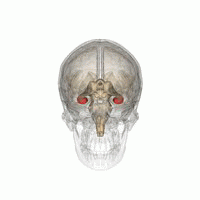
Photo from wikipedia
Background: Tinnitus is a common disorder that causes significant morbidity; however, the neurophysiological mechanism is not yet fully understood. A relationship between tinnitus and limbic system has been reported. As… Click to show full abstract
Background: Tinnitus is a common disorder that causes significant morbidity; however, the neurophysiological mechanism is not yet fully understood. A relationship between tinnitus and limbic system has been reported. As a significant component of the limbic system, the hippocampus plays an important role in various pathological processes, such as emotional disturbance, decreased learning ability, and deterioration of memory. This study was aimed to explore the role of the hippocampus in the generation of tinnitus by electrophysiological technology. Methods: A tinnitus model was established in rats through intraperitoneal injection of salicylate (SA). Subsequently, the spontaneous firing rate (SFR) of neurons in the hippocampal CA1 area was recorded with in vivo multichannel recording technology to assess changes in excitability induced by SA. To investigate the effect of excitability changes of hippocampus on the auditory pathway, the hippocampus was electrically stimulated and neural excitability in the auditory cortex (AC) was monitored. Results: Totally 65 neurons in the hippocampal CA1 area were recorded, 45 from the SA group (n = 5), and 20 from the saline group (n = 5). Two hours after treatment, mean SFR of neurons in the hippocampal CA1 area had significantly increased from 3.06 ± 0.36 Hz to 9.18 ± 1.30 Hz in the SA group (t = −4.521, P < 0.05), while no significant difference was observed in the saline group (2.66 ± 0.36 Hz vs. 2.16 ± 0.36 Hz, t = 0.902, P > 0.05). In the AC, 79.3% (157/198) of recorded neurons showed responses to electrical stimulation of the hippocampal CA1 area. Presumed pyramidal neurons were excited, while intermediate neurons were inhibited after electrical stimulation of the hippocampus. Conclusions: The study shows that the hippocampus is excited in SA-induced tinnitus, and stimulation of hippocampus could modulate neuronal excitability of the AC. The hippocampus is involved in tinnitus and may also have a regulatory effect on the neural center.
Journal Title: Chinese Medical Journal
Year Published: 2018
Link to full text (if available)
Share on Social Media: Sign Up to like & get
recommendations!